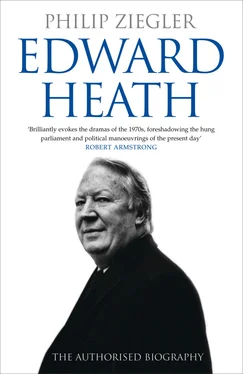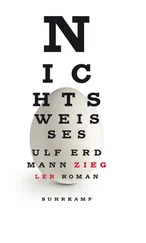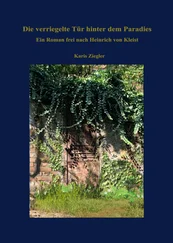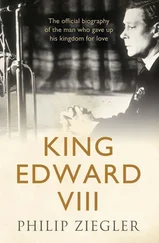Heath’s own views are hard to establish. He told his pps, Anthony Kershaw, that he was not going to throw his hat into the ring. If people wanted to vote for him he could not stop them, but he would give them no encouragement. In his biography of Alec Home, D. R. Thorpe states that, while Heath was staying with the chairman of the 1922 Committee, John Morrison, at his Scottish home on Islay in July 1963, the question of the succession came up. Morrison told Heath that Alec Home was going to be urged to run and Heath agreed to back him if he did. This Heath strongly denies. He told Hailsham that he had played no part in the choice of a new leader except to tell the Lord Chancellor, Lord Dilhorne, who it was that he personally supported. He had no discussions with Butler, Maudling or Macleod, and the matter was never discussed while he was at Islay. At that time, anyway, he pointed out, Macmillan’s retirement did not seem imminent. It is almost incredible that during their days and, still more, long evenings on Islay two men as passionately concerned with politics as Morrison and Heath should not even have touched on the question of who would be Macmillan’s successor. Heath, however, had no high opinion of Morrison’s judgment or his discretion; he might well have chosen to abort the conversation or to confine himself to a non-committal grunt when Home’s candidature came into question. Whatever the truth, Heath did back Home and made no secret of his loyalties. 46
Why he did so is another matter. He knew Home well, had found him easy to work with and could be reasonably confident that, with the former Foreign Secretary in Number 10, his own career would flourish. Was that all there was to it? Jim Prior, who worked as closely with Heath as any Tory and was his strong supporter, suspected that there was more. ‘Perhaps Ted had recognised that, although his own time had not yet come in 1963, he did stand a chance of being Alec’s successor, and that he would be much more out of the running if either Rab Butler or Quintin Hailsham had been chosen. This seems the most likely explanation…but it does also reveal Ted in a more scheming guise than I was to associate with him on virtually any other occasion.’ 47A more suspicious nature still might see Heath as even more guileful. Home was twelve years older than Heath, not believed to be hungry for office or likely to be particularly tenacious in holding on to it. He would be taking command at a time when the Tory ship was heading into storms, probably into electoral defeat. He would not be a caretaker prime minister but he would more nearly fill that role than any of his rivals. Heath would probably have backed him anyway, but a measure of self-interest may well have been among his motives. Certainly Home was a far happier choice from Heath’s point of view than either Macleod or Maudling, one only two years older than him, the other two years younger. If either of these secured the succession Heath’s prospects of reaching Number 10 would have been dim indeed.
In the event it became clear that Macleod had made too many enemies on the right and centre of the party to be in the running. In a ballot of Tory MPs, Maudling secured 48 first choices to Heath’s 10, and 66 second or third choices to Heath’s 17, but since Heath was not a formal candidate this meant little. Quite as important was the fact that Maudling was credited with six ‘definite aversions’ – in effect, blackballs – against Heath’s one. Hailsham, at one time said to be Macmillan’s favoured successor, piled up so many ‘definite aversions’ as a result of his ill-judged and extravagant performance at the Party Conference that he was ruled out. In the end the Queen, largely, it seems, on Macmillan’s recommendation, sent for Home. It was the consummation Heath had hoped for. It was made even better by the fact that Iain Macleod and Enoch Powell took exception to the secretive and, as they saw it, undemocratic process by which Home was finally selected and refused to serve under him. By doing so they gravely damaged their own prospects of future promotion. On 19 October 1963, the Earl of Home, as he then was, became Prime Minister, renounced his peerage and stood for election to the House of Commons as Alec Douglas-Home. It remained to see what job he would offer Heath.
Конец ознакомительного фрагмента.
Текст предоставлен ООО «ЛитРес».
Прочитайте эту книгу целиком, купив полную легальную версию на ЛитРес.
Безопасно оплатить книгу можно банковской картой Visa, MasterCard, Maestro, со счета мобильного телефона, с платежного терминала, в салоне МТС или Связной, через PayPal, WebMoney, Яндекс.Деньги, QIWI Кошелек, бонусными картами или другим удобным Вам способом.












